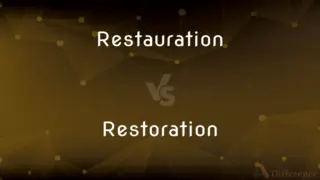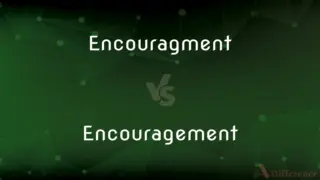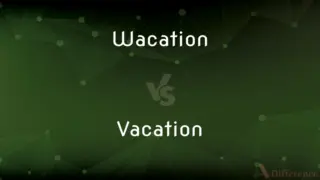Applaude vs. Applause — Which is Correct Spelling?
Edited by Tayyaba Rehman — By Munazza Shafiq — Updated on April 28, 2024
"Applaude" is the incorrect spelling of "applause," which means the clapping of hands as a show of approval or enjoyment.
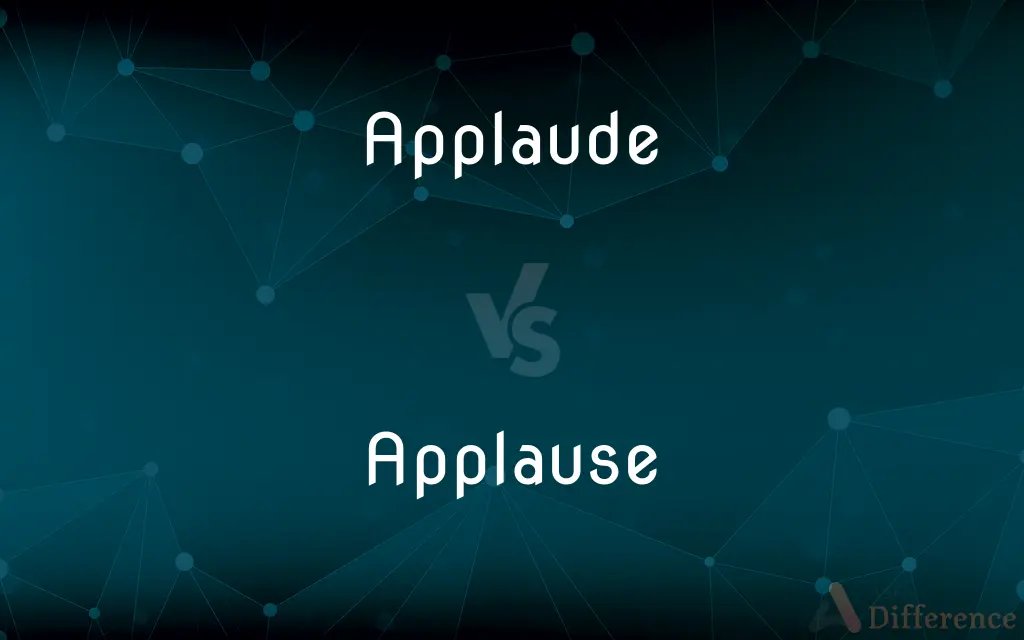
Table of Contents
Which is correct: Applaude or Applause
How to spell Applause?

Applaude
Incorrect Spelling

Applause
Correct Spelling
ADVERTISEMENT
Key Differences
Note that "applause" contains two 'p's and one 'l,' which can be memorized with the phrase "people loudly applauding use energetic sounds."
Recall that "applause" ends with "-ause," similar to "pause," emphasizing that both words involve a stoppage or break (a pause in a performance for applause).
How Do You Spell Applause Correctly?
Incorrect: Everyone joined in the applaude when she finished speaking.
Correct: Everyone joined in the applause when she finished speaking.
Incorrect: He was greeted with loud applaude at the conference.
Correct: He was greeted with loud applause at the conference.
Incorrect: The audience gave a big applaude after the performance.
Correct: The audience gave a big applause after the performance.
ADVERTISEMENT
Incorrect: Her speech earned a gentle applaude from the crowd.
Correct: Her speech earned a gentle applause from the crowd.
Incorrect: The play ended, and the applaude was enthusiastic and prolonged.
Correct: The play ended, and the applause was enthusiastic and prolonged.
Applause Definitions
The clapping of hands to show enjoyment or approval of a performance or speech.
The applause filled the theater at the end of the play.
Approval or praise expressed by clapping.
After the concert, the applause from the audience lasted for several minutes.
A gesture involving clapping as a sign of approval, especially in a crowd.
The comedian's joke was met with loud applause.
A sound or act of clapping hands in appreciation or celebration.
Her announcement was followed by enthusiastic applause.
The action of expressing commendation or approval by clapping hands together.
The successful rescue effort was welcomed with heartfelt applause from the community.
Applause (Latin applaudere, to strike upon, clap) is primarily a form of ovation or praise expressed by the act of clapping, or striking the palms of the hands together, in order to create noise. Audiences usually applaud after a performance, such as a musical concert, speech, or play, as a sign of enjoyment and approval.
Approval expressed especially by the clapping of hands.
Praise; commendation
A scientific discovery that won critical applause.
The act of applauding; approbation and praise publicly expressed by the clapping of hands, stamping or tapping of the feet, acclamation, huzzas, or other means; marked commendation.
The act of applauding; approbation and praise publicly expressed by clapping the hands, stamping or tapping with the feet, acclamation, huzzas, or other means; marked commendation.
The brave man seeks not popular applause.
A demonstration of approval by clapping the hands together
Applause Meaning in a Sentence
The students burst into applause after the dean's encouraging words.
The audience's applause was so loud it echoed through the hall.
He waited for the applause to die down before he continued his speech.
She smiled broadly at the warm applause from the crowd.
Each speaker was greeted with polite applause.
The children clapped their hands in applause after the puppet show.
The applause grew louder as the actor took a bow.
The crowd gave a standing ovation and loud applause.
After the recital, the applause continued for several minutes.
Her performance was met with thunderous applause.
Applause broke out as the curtain fell on the stage.
The applause was a clear sign of the audience's appreciation.
The applause at the end of the lecture was enthusiastic.
The applause signaled that it had been an outstanding performance.
As the winner was announced, applause filled the room.
The show concluded to vigorous applause.
The applause was heartfelt, reflecting the emotional impact of the speech.
The applause echoed off the walls of the ancient theater.
Her entrance was met with immediate applause.
The conference ended with applause for all the speakers.
Applause rippled through the audience as the lights dimmed.
He acknowledged the applause with a nod of his head.
They received the news with applause and cheers.
He raised his hands to quiet the applause.
Their achievements were celebrated with much applause.
Applause Idioms & Phrases
Scattered applause
Applause that is sporadic and not very loud, often from a few people in an audience.
The speaker received only scattered applause.
Burst into applause
To suddenly begin clapping hands in approval.
The audience burst into applause as the magician concluded his trick.
Round of applause
A period during which an audience claps to show enjoyment or appreciation.
Let’s give a round of applause for all the participants.
Earn applause
To gain approval or praise expressed through clapping.
The young gymnast earned applause with her flawless routine.
Warm applause
Applause that is enthusiastic and friendly.
The returning hero was met with warm applause.
Lead the applause
To be the first to start clapping.
The conductor led the applause for the soloist.
Thunderous applause
Extremely loud and enthusiastic clapping.
The champion was welcomed with thunderous applause.
Rousing applause
Applause that is vigorous and enthusiastic.
His stirring speech ended with rousing applause.
Draw applause
To elicit clapping from an audience.
The stunning visual effects in the play drew applause.
Appreciative applause
Clapping that shows gratitude and appreciation.
The performance ended to appreciative applause.
Polite applause
Clapping that is mild and not particularly enthusiastic, often performed out of courtesy.
The presentation ended with polite applause from the colleagues.
Die down applause
When clapping gradually stops.
He waited for the applause to die down before speaking.
Spontaneous applause
Applause that occurs naturally without prompting.
Her heartfelt words triggered spontaneous applause.
Fade into applause
When sounds or speech fade and are replaced by clapping.
His voice faded into applause as he concluded.
Deserve applause
To merit recognition or praise expressed by clapping.
The volunteers certainly deserve applause for their hard work.
Meet with applause
To be received with clapping by an audience.
Each announcement at the event was met with applause.
Applause breaks out
Applause that starts suddenly in a group of people.
As the hero appeared, applause broke out.
Greet with applause
To welcome someone with clapping.
The guest speaker was greeted with applause upon entering the hall.
Unanimous applause
Applause that is given by all present, without exception.
The decision was met with unanimous applause.
Extend applause
To continue clapping for a longer period than usual.
The audience extended their applause, not wanting the moment to end.
Common Curiosities
How many syllables are in applause?
Applause has two syllables.
What is a stressed syllable in applause?
The stressed syllable in "applause" is "plause."
Why is it called applause?
"Applause" comes from the Latin "applaudere," meaning to clap or strike upon, reflecting the action of clapping hands together.
How do we divide applause into syllables?
Applause is divided as ap-plause.
How is applause used in a sentence?
"Applause" is used as a noun to describe the act of clapping to show approval or enjoyment.
What is the verb form of applause?
The verb form related to "applause" is "applaud."
What is the root word of applause?
The root word of "applause" is the Latin "applaudere."
What part of speech is applause?
Applause is a noun.
What is another term for applause?
Another term for "applause" is "ovation" or "clapping."
What is the singular form of applause?
The singular form of "applause" is itself, as it is an uncountable noun.
What is the pronunciation of applause?
Applause is pronounced as /əˈplɔːz/.
Is applause an adverb?
No, "applause" is not an adverb.
Is the word applause Gerund?
No, "applause" is a noun and does not have a gerund form.
Is the word “applause” a Direct object or an Indirect object?
In sentences like "The audience gave loud applause," "applause" functions as a direct object.
Is applause an abstract noun?
Yes, "applause" is an abstract noun as it refers to the concept of clapping as a form of approval.
Which vowel is used before applause?
Typically, any vowel sound can precede "applause" depending on the structure of the sentence.
Which preposition is used with applause?
Common prepositions used with "applause" include "for" and "to," as in "applause for the winner" or "lead to applause."
Which conjunction is used with applause?
Conjunctions such as "and" or "but" can be used with "applause" in compound sentences.
Which article is used with applause?
The article "the" is commonly used with "applause" in specific contexts, as in "the applause was thunderous."
What is the plural form of applause?
The plural form of "applause" is also "applause," as it is uncountable.
What is the opposite of applause?
The opposite of "applause" could be "silence" or "booing."
Is applause a noun or adjective?
"Applause" is a noun.
Is applause a collective noun?
Yes, "applause" can be considered a collective noun as it refers to clapping by a group of people collectively.
Is applause a negative or positive word?
"Applause" is generally a positive word as it indicates approval or enjoyment.
Is applause a vowel or consonant?
The word "applause" starts with a vowel.
Is applause a countable noun?
No, "applause" is considered an uncountable noun.
Is the applause term a metaphor?
No, "applause" is used literally to refer to the act of clapping hands.
Is the word applause imperative?
No, "applause" as a noun does not have an imperative form.
Which determiner is used with applause?
Determiners such as "some," "much," or "little" can be used with "applause" depending on the context.
Share Your Discovery
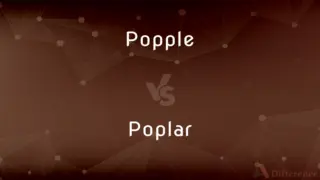
Previous Comparison
Popple vs. Poplar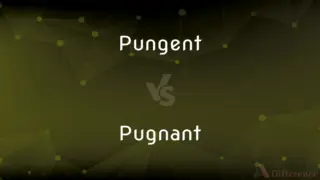
Next Comparison
Pungent vs. PugnantAuthor Spotlight
Written by
Munazza ShafiqEdited by
Tayyaba RehmanTayyaba Rehman is a distinguished writer, currently serving as a primary contributor to askdifference.com. As a researcher in semantics and etymology, Tayyaba's passion for the complexity of languages and their distinctions has found a perfect home on the platform. Tayyaba delves into the intricacies of language, distinguishing between commonly confused words and phrases, thereby providing clarity for readers worldwide.












